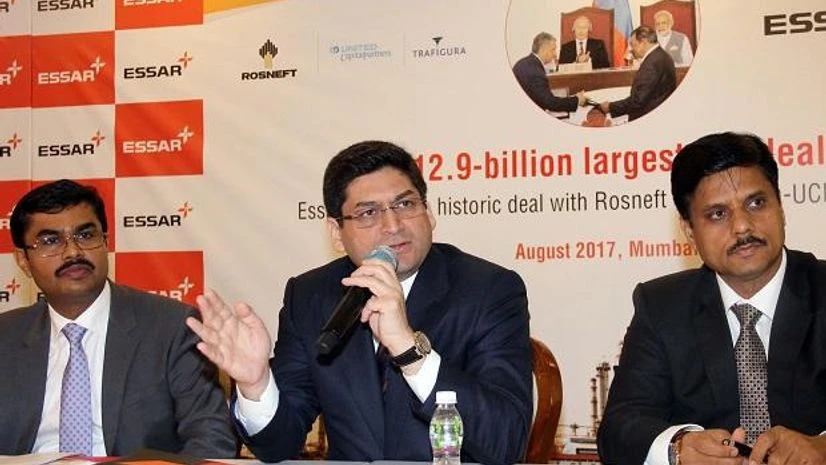The Essar Group, one of the most indebted conglomerates in the country, has decided to pare as much as 67 per cent of its consolidated debt of Rs 1.05 trillion from the proceeds of the $12.9-billion sale of Essar Oil to Russian oil giant Rosneft, concluded on Monday.
The Ruias-promoted Essar Group, as of March 2017, had a long-term debt of Rs 1.05 trillion and a working capital loan of Rs 30,000 crore at the holding company and group companies level, taking the total burden to Rs 1.35 trillion.
Essar Group director Prashant Ruia described the debt reduction of Rs 70,400 crore as the largest in the history of corporate India and the $12.9-billion sale of EOL as the biggest foreign direct investment (FDI) in the country to date.
Also Read
"With this deal, we've completed our monetisation and deleveraging programme, which is the largest undertaken by any corporate in recent years in the country. We've substantially deleveraged our portfolio companies' balance sheets. With the completion of our capex (capital expenditure) programme of over Rs 1.2 trillion (Rs 1.2 lakh crore), we now look forward to a period of growth in our wider portfolio of businesses," Ruia said.
Essar Group founder Shashi Ruia said this landmark transaction and the resultant debt reduction usher in a new phase of growth across the group portfolio.
Significantly, this deleveraging will have no positive impact on the company's troubled steel venture which has gone to the National Company Law Tribunal (NCLT) for possible liquidation. Essar Steel with over Rs 44,000 crore debt had been in trouble after the Reserve Bank of India (RBI) named it along with 11 other largest defaulters in June and asked banks to refer these companies to the NCLT.
When asked about this, Ruia said, "Essar Oil and Essar Steel are two separate legal entities and businesses and the law does not allow transfer of money from one account to the other."
Giving a break-up of the debt repay, an Essar official said, "On closure of sale of Essar Oil to Rosneft and Trafigura-UCP consortium, Essar Energy will repay $5 billion to the lenders to repay at the holding company (Essar Holdings), USD 5.4 billion debt of Essar Oil, Vadinar Oil Terminal and Vadinar Power Company which has become non-Essar exposure (will be transferred to the new owners of EOL.)
"Further, about $600 million or Rs 4,000 crore will be used to repay domestic lenders (primarily Life Insurance Corporation or LIC — Rs 800 crore — and other insurance companies) at the operating company level (Essar Oil, Vadinar Oil Terminal and Vadinar Power), taking the group's overall debt exposure down by about $11 billion or Rs 70,400 crore."
Domestic lenders have an exposure of around Rs 35,000 crore to Essar Oil, but they will get only Rs 4,000 crore from the payback as "they have elected to stay with the new owner", Ruia said.
Most of this $5 billion debt is from State Bank of India (SBI), ICICI Bank, Axis Bank, IDIBI Bank and YES Bank, while the total number of creditors is 19.
A company official said of the $5 billion debt being transferred to Rosneft, around $4 billion are term loans and $1 billion working capital loans.
But they'll get around Rs 4,000 crore paid back from over Rs 35,000 crore of loans to Essar Oil, as they have "finally elected to stay with the new owner", Ruia said.
Officials also said a part of the proceeds that flow into the accounts of the Ruias, which analysts peg at $1.9 billion, will be partly used to pay the premium that the promoter got through the sale to retail and other investors who tendered their shares at the open offer within 60 days from Monday, according to Sebi guidelines.
"Those shareholders who tendered their shares in the open offer will be paid back according to the margin from the deal as per Sebi's buyback regulations," Ruia said.

)
